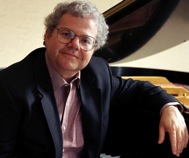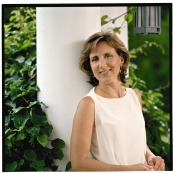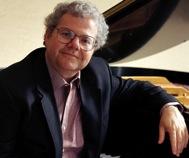
Performing a program of short works — Chopin songs and solo piano pieces, Schumann lieder, and, in a nod to the contemporary art song repertoire, Stephen Prutsman’s recent song cycle Piano Lessons — Upshaw and Ax paid affectionate, insightful tribute to the Romantic composers and their musical descendents.
An unmistakable symmetry was at work in this well-structured event, presented as part of the San Francisco Symphony’s Great Performers series. In a slight departure from traditional vocal recital format, Upshaw and Ax approached the program as equals. The stage was set with a table, a chair, and a vase of flowers, suggesting a 19th-century salon, and during Ax’s performances of the solo piano works, Upshaw sat onstage, listening with rapt attention.
The symmetry extended to the featured composers, as well. Born a scant three months apart — Chopin in March 1810, Schumann in June of the same year — both embody the fertile imagination and expressiveness of their era. Upshaw and Ax illuminated their

similarities, as well as their differences, in emotionally alert and technically assured performances.
Chopin’s From Polish Songs, Op. 74, quickly illustrated these artists’ commitment. The program opened with Zyczenie (The wish), and in Ax’s capable hands, the familiar piano part, based on a mazurka, came across with uncommon grace. Upshaw, easily negotiating the Polish text, sang with light, fresh tone. In Smutha Rzeka (Sad stream), a lament by a mother who has endured the deaths of seven daughters, the singer darkened the voice, and Ax’s eloquent playing conspired with her vocalism to poignant effect. Moja pieszczotha (My darling), which builds to an ecstatic climax (not to mention a kiss), evoked a giddy, sensuous response.
Ax played with sensitivity throughout the evening, and his performances of Chopin’s solo piano works were among the highlights. Here, he emphasized the architecture, as well as the nuance, in the composer’s writing for small forms. The Four Mazurkas, Op. 41, elicited meticulous technique, sounding by turns elegant, folksy, and dramatic. The Two Nocturnes, Op. 27, were every bit as brilliant: the first (in C-sharp minor), with its echoes of a Venetian barcarolle, cast a haunting spell, while in the second (in D-flat major), his playing evoked a hushed, meditative atmosphere akin to a prayer.
Engaged in the Musical Contrasts
Still, nothing quite approached the luster of the second half’s Schumann set. In 12 settings, from the vibrant In der Fremde (Far from home) to the otherworldly Widmung (Dedication), both artists were fully engaged. This is music of fantastic color, texture, and dynamics, and the performances savored the contrasts; a transition from the dark anguish of Heiss mich nicht redden (Don’t ask me to speak) to the radiance of Singet nicht in Trauertonen (Do not sing in sorrowful tones) brought to mind the sensation of stepping outside into bright sunlight. Mignon emerged a potent minidrama, with Upshaw tapping a deep well of emotion in her outpouring of loss and regret.In between the Chopin and Schumann came Prutsman’s Piano Lessons (a substitute for an originally scheduled new work by Osvaldo Golijov, who was unable to complete the score in time for this recital). Prutsman’s cycle of six songs, incorporating texts by former U.S. Poet Laureate Billy Collins, depicts a student’s reluctance, exasperation, and eventual acceptance as he attempts to learn scales, decipher pedagogy, and endure the ennui of long afternoons of practice. Collins’ writing is whimsical yet with an edge, and Prutsman’s score matches it with pointed, dreamlike musical episodes that recall five-finger exercises and pay homage to icons from Debussy to Horace Silver. If the work seems to skim its emotional surface, the performance was persuasive; Ax, discreetly pedaling, maintained an unerring rhythmic sense, while Upshaw lent charming emphasis to the vocal part.
There was one encore. As part of the Schumann set, Upshaw and Ax had performed the composer’s Er ist’s. They returned with Hugo Wolf’s setting of the same text. Wolf’s is aptly flamboyant, and it received an effusive performance — albeit one that sounded a bit insubstantial in the shadow of Schumann.

